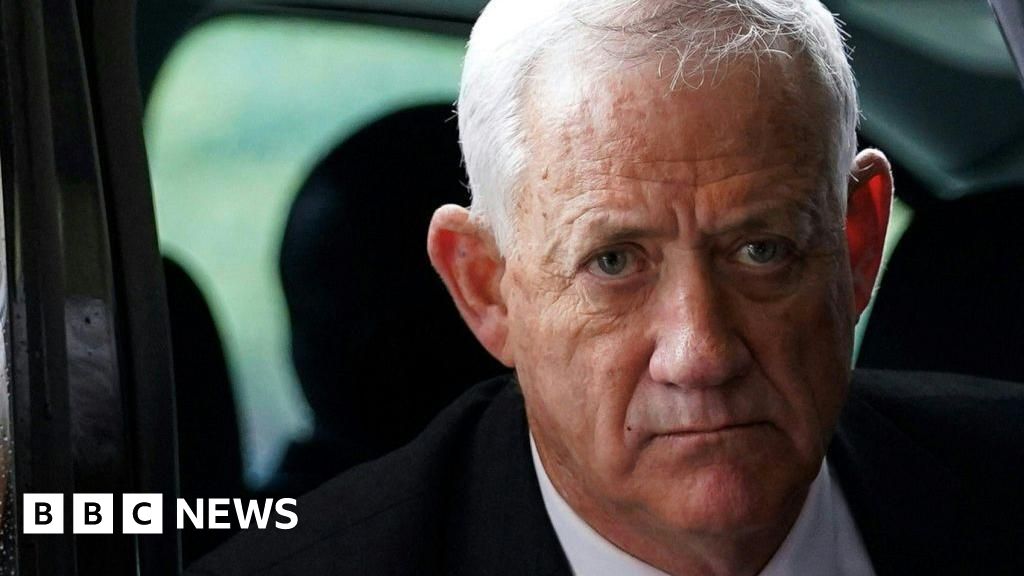Image source, Getty Images
- Author, Christy Cooney
- Role, BBC News
-
Israeli war cabinet minister Benny Gantz has threatened to resign unless Prime Minister Benjamin Netanyahu sets out a post-war plan for the Gaza Strip.
Mr Gantz set an 8 June deadline for a plan to achieve six “strategic goals”, including the end of Hamas rule in Gaza and the establishment of a multinational civilian administration for the territory.
“If you put the national over personal, you will find in us partners in the struggle,” he said. “But if you choose the path of fanatics and lead the entire nation to the abyss, we will be forced to quit the government.”
Mr Netanyahu dismissed the comments as “washed-up words” that would mean “defeat for Israel”.
The war cabinet was established in the days following the 7 October attacks, which saw fighters from Hamas and other militant groups kill around 1,200 people and take another 252 hostages after entering Israel from Gaza.
Mr Gantz’ comments come just days after another war cabinet member, Defence Minister Yoav Gallant, urged Mr Netanyahu to state publicly that Israel had no plans to take over civilian and military rule in Gaza.
Mr Gallant said he had raised the issue repeatedly for months but had received no response.
The episode shows a growing rift in the Israeli war cabinet and Mr Netanyahu’s government.
Mr Gantz and Mr Gallant say that maintaining military control in Gaza would increase Israel’s security risks, while others, including far-right members of Mr Netanyahu’s ruling coalition in the government, believe continued control is necessary in order to defeat Hamas.
In a televised address on Saturday, Mr Gantz told Mr Netanyahu that the “people of Israel are watching you”.
“You must choose between Zionism and cynicism, between unity and factions, between responsibility and lawlessness, between victory and disaster,” he said.
Also among the six strategic goals he set out were the return of all Israeli and foreign hostages still held by Hamas in Gaza and the return of displaced Palestinian civilians to northern Gaza by 1 September.
He also said Israel should continue to seek the normalisation of relations with Saudi Arabia as part of a “comprehensive process to create an alliance with the free world and the West against Iran and its allies”.
Responding to the speech, Mr Netanyahu said that to meet Mr Gantz’s demands would lead to “the end of the war and a defeat for Israel, the abandoning of most of the hostages, leaving Hamas intact and the establishment of a Palestinian state”.
The chief of staff of the country’s army, Herzi Halevi, has also privately pressed on Mr Netanyahu the need for a “day after” strategy, according to reports in Israeli media.
Recent days have seen the Israeli military re-enter areas of northern Gaza previously declared clear of Hamas, raising doubts about the government’s strategy for eliminating the group.
Fighting has particularly renewed in the area of Jabalia near Gaza City, where Israel says Hamas has begun making attempts to regroup. On Saturday Israeli troops and tanks pushed further into the district. Palestinian medics said one of the Israeli strikes had killed 15 people and wounded dozens more.
Mr Halevi is said to have argued that, absent a diplomatic process to establish a governing body other than Hamas, the military will be forced to launch repeated campaigns to keep the group at bay.
Mr Gantz proposed an American, European, Arab, and Palestinian administration that could manage civilian affairs in Gaza while the foundations are laid for a future alternative government.
He added that Israel could maintain a degree of “security control” in the meantime.
Last week, Israel launched an operation in the southern city of Rafah – to which civilians from elsewhere in Gaza had previously been told to evacuate – saying it needed to enter the city in order to target Hamas’ last remaining strongholds.
The operation has prompted renewed concern about the safety of civilians, with Philippe Lazzarini, the head of United Nations Relief and Works Agency (UNRWA), saying some 800,000 have again been displaced.
“Since the war in Gaza began, Palestinians have been forced to flee multiple times in search of safety that they have never found,” he said.
“When people move, they are exposed, without safe passage or protection. Every time, they are forced to leave behind the few belongings they have: mattresses, tents, cooking utensils and basic supplies that they cannot carry or pay to transport.
“The claim that people in Gaza can move to ‘safe’ or ‘humanitarian’ zones is false. Each time, it puts the lives of civilians at serious risk.”
Late on Saturday Israel also issued new evacuation orders for parts of northern Gaza, saying armed groups had fired rockets at Israel.
Hamas said Israel’s “brutal raids” on Jabalia had killed dozens of civilians and wounded hundreds more.

Emily Foster is a globe-trotting journalist based in the UK. Her articles offer readers a global perspective on international events, exploring complex geopolitical issues and providing a nuanced view of the world’s most pressing challenges.








